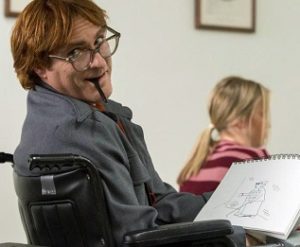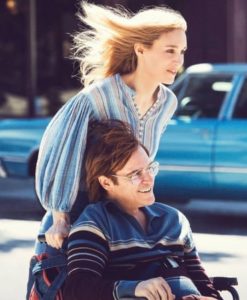Don’t Worry, He Won’t Get Far on Foot
 John Callahan was a macabre cartoonist, whose doodlings often highlighted the perils of those with physical disabilities. Paralyzed in a horrific automobile accident at the age of 21, Callahan spent the remaining 38 years of his life confined to a wheelchair, drawing the world around him as filtered through his ghastly sense of well-being. That Callahan’s life would seem an odd choice for the subject of a major motion picture simply makes Gus Van Sant’s “Don’t Worry, He Won’t Get Far on Foot” all the more intriguing. We’re asked to care about a man who was such a drunk he essentially sealed his own fate when he and his equally drunk acquaintance took to the streets of Portland, Oregon one fateful night in 1972.
John Callahan was a macabre cartoonist, whose doodlings often highlighted the perils of those with physical disabilities. Paralyzed in a horrific automobile accident at the age of 21, Callahan spent the remaining 38 years of his life confined to a wheelchair, drawing the world around him as filtered through his ghastly sense of well-being. That Callahan’s life would seem an odd choice for the subject of a major motion picture simply makes Gus Van Sant’s “Don’t Worry, He Won’t Get Far on Foot” all the more intriguing. We’re asked to care about a man who was such a drunk he essentially sealed his own fate when he and his equally drunk acquaintance took to the streets of Portland, Oregon one fateful night in 1972.
Great performance required
To say “Don’t Worry, He Won’t Get Far on Foot” (The title is taken from one of Callahan’s cartoons.) requires an actor superb enough to cause us to care for a villain is an understatement. Van Sant’s original screenplay necessitates a performance along the lines of that given by Malcolm MacDowell in “A Clockwork Orange” – the beast we find ourselves rooting for, even though we acknowledge his inherent sin.
Joaquin Phoenix
Enter Joaquin Phoenix, one of our greatest current actors (Remember “The Master?”), to manhandle the role of Callahan, the drunk. Phoenix expectedly excels during the early “drunken years” scenes, but his performance truly shines during the post-accident years. Hitting on nurses and social workers even as he lay in his hospital bed, Phoenix’s Callahan is the type of scoundrel we believe has, in many ways, received his just desserts. No, we don’t wish a lifetime of paralysis on anyone, but who better than a drunk to be forced to live with the consequences of his actions. That his situation apparently doesn’t change his heart merely accentuates our disdain for him.
Alcoholics Anonymous
But then something miraculous happens. Callahan joins Alcoholics Anonymous. And not just any AA group. No, this isn’t some touchy-feely assemblage of overly cheery types meeting in a church basement. Callahan joins a group which meets in the home of its leader, Donnie Green, played by an almost unrecognizable Jonah Hill. Donnie doesn’t pussyfoot around the horrors of alcoholism. Donnie hits Callahan hard, guiding him with a firm hand – and an equally gentle voice – through the twelve steps of the program.
While “Don’t Worry, He Won’t Get Far on Foot” isn’t an infomercial for AA, it may as well be. Van Sant’s screenplay exposes the absolute revulsion experienced by alcoholics on their often erratic road to real recovery. In the film’s most poignant sequence, Donnie requires Callahan to personally make amends with those he has wronged in the past. Difficult to do when confined to a wheelchair, I grant you; but Callahan succeeds out of pure determination – only coming up short when he fails (again) to locate the mother who abandoned him as a youngster.
Superb acting
 Phoenix is brilliant in laying bare the angst Callahan feels over the absence of his mother. We feel his hurt; the longing for his next drink; the craving for the way he used to be. This is his best performance since “The Master” in 2012. And in a 180-degree opposite turn, it is Hill’s best since “Wolf of Wall Street” in 2013. Rooney Mara also shines as the case worker turned flight attendant smitten by Callahan during his post-accident (and particularly his post-drinking) years.
Phoenix is brilliant in laying bare the angst Callahan feels over the absence of his mother. We feel his hurt; the longing for his next drink; the craving for the way he used to be. This is his best performance since “The Master” in 2012. And in a 180-degree opposite turn, it is Hill’s best since “Wolf of Wall Street” in 2013. Rooney Mara also shines as the case worker turned flight attendant smitten by Callahan during his post-accident (and particularly his post-drinking) years.
Affirmation of Life
It’s important to note that the two milestones of Callahan’s life (the accident and his complete cessation from alcohol) do not occur simultaneously. In other words, the accident doesn’t automatically end his drinking. If anything, it is the painful search for his mother that finally pushes Callahan to change his life. And by the film’s third act, we find ourselves rooting for Callahan/Phoenix with just cause. While I wouldn’t go so far as to say “Don’t Worry, He Won’t Get Far on Foot” is a stand-up-and-cheer movie, a la “Rocky,” it is an affirmation of life and it embraces the power of the human spirit.
Best post-drunk performance
If the three greatest celluloid depictions of those struggling with alcohol addiction are Ray Milland in “The Lost Weekend” (1945), Jack Lemmon in “The Days of Wine and Roses” (1962) and Nicholas Cage in “Leaving Las Vegas” (1995), then Joaquin Phoenix gives the best depiction ever of one struggling to break the addiction. His performance is so key to the success of Van Sant’s film that the entire project would fail if placed in the hands of a less capable actor. That Phoenix succeeds so remarkably should (and this is a big “should”) garner him a Best Actor nod next winter.
Existence of a higher power
“Don’t Worry, He Won’t Get Far on Foot” is not a “fun” movie; parts of it are difficult to watch. But it is a testament to the existence of a higher power, and to man’s ability to accomplish anything he wants. That Callahan never loses his lurid take on the world around him (again, a la Malcolm MacDowell in “A Clockwork Orange”) causes us to at least respect him even more. He doesn’t have to sell his soul to change his life.
Andy Ray’s reviews also appear on http://youarecurrent.com/category/nightandday/film-reviews/
and he serves as the radio film critic for https://indyboomer.com/radio/